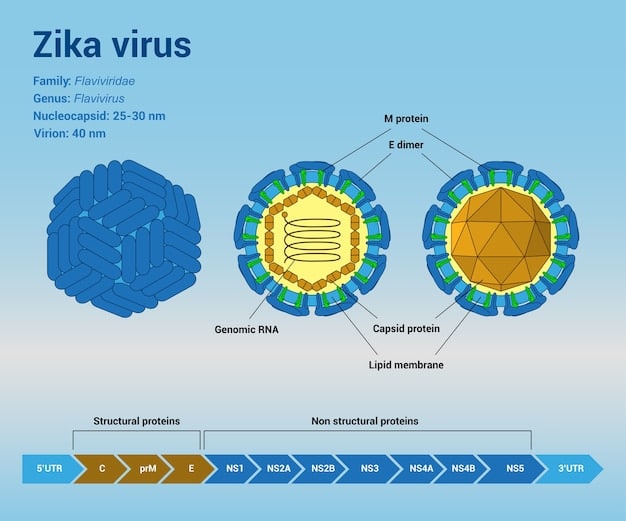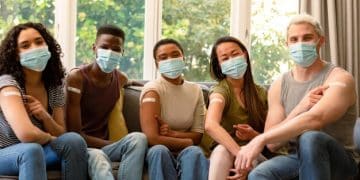New RSV Vaccine: Risks, Benefits for Adults

The new Respiratory Syncytial Virus (RSV) vaccines offer significant protection for adults, particularly older individuals and those with underlying health conditions, by reducing severe illness, yet understanding potential side effects and ongoing research is crucial for informed decision-making.
As the landscape of public health continually evolves, staying informed about new medical advancements is paramount. A particularly significant development catching the attention of health professionals and the general public alike is the emergence of new vaccines designed to combat Respiratory Syncytial Virus (RSV) in adults. This article aims to provide a comprehensive guide to Understanding the Risks and Benefits of the New RSV Vaccine for Adults, shedding light on what these vaccines mean for safeguarding health, especially in vulnerable populations.
The growing threat of RSV in adults
RSV, commonly associated with severe respiratory illness in infants and young children, is increasingly recognized as a significant public health concern for adults, particularly older individuals and those with compromised immune systems. While often presenting as a mild cold in healthy adults, RSV can escalate into severe lower respiratory tract diseases such as bronchiolitis and pneumonia, leading to hospitalizations and, in some cases, fatalities. The economic burden and strain on healthcare systems due to adult RSV infections are substantial, underscoring the urgent need for effective preventive measures.
Understanding the full scope of RSV’s impact on adult morbidity and mortality has been a critical step in developing targeted interventions. Research now indicates that RSV contributes significantly to seasonal respiratory illness outbreaks, often mirroring influenza in its potential for severe outcomes among vulnerable populations. This heightened awareness has catalyzed significant investment in vaccine research and development, leading to the recent approvals of new RSV vaccines for adults.
Who is most at risk?
Certain adult populations face a disproportionately higher risk of severe RSV infection. These include:
- Older Adults: Individuals aged 60 and above are more susceptible to severe RSV due to age-related decline in immune function (immunosenescence).
- Individuals with Chronic Medical Conditions: People with pre-existing heart or lung diseases (e.g., congestive heart failure, chronic obstructive pulmonary disease – COPD, asthma), diabetes, or kidney disease are at increased risk.
- Immunocompromised Individuals: Those with weakened immune systems due to underlying medical conditions (e.g., HIV/AIDS, cancer) or immunosuppressive medications (e.g., organ transplant recipients) are highly vulnerable.
The severity of RSV in these groups can range from exacerbated chronic conditions to life-threatening respiratory failure, necessitating advanced medical support. Recognizing these risk factors is crucial for targeted vaccination strategies and public health campaigns aimed at protecting the most vulnerable.
The potential for RSV to complicate existing health conditions and its ability to spread rapidly within communities highlight the importance of preventative strategies. The development of vaccines specifically for adults represents a critical advancement in combating this pervasive respiratory virus. These vaccines offer a proactive approach to reducing the incidence of severe RSV, thereby lessening the burden on individuals and healthcare infrastructure.
Understanding the science: How the new RSV vaccines work
The recent approval of RSV vaccines for adults represents a scientific breakthrough, building upon decades of research into the virus and its mechanisms of infection. These vaccines, primarily protein subunit vaccines, target the fusion (F) protein of the RSV virus, a key component that the virus uses to enter human cells. By exposing the immune system to a stabilized version of this protein, the vaccines stimulate the production of antibodies that can neutralize the virus and prevent infection.
The development process for these vaccines involved extensive preclinical and clinical trials, adhering to rigorous regulatory standards. A significant challenge in RSV vaccine development has historically been the instability of the F protein, which can switch between pre-fusion and post-fusion conformations, affecting antibody recognition. Modern vaccine technology has overcome this by stabilizing the protein in its pre-fusion state, which is more effective at eliciting a protective immune response.
Key vaccine technologies
Current RSV vaccines leverage advanced biotechnological approaches:
- Recombinant Protein Technology: This involves manufacturing specific viral proteins (like the pre-fusion F protein) using genetically engineered cells. These purified proteins are then formulated into a vaccine that can safely stimulate an immune response without exposing the recipient to the live virus.
- Adjuvant Systems: Some RSV vaccines incorporate adjuvants, substances that enhance the immune response to the vaccine antigen. Adjuvants help to make the immune response stronger, broader, and more long-lasting, thereby improving the vaccine’s efficacy, especially in older adults whose immune systems may be less responsive.
- mRNA Technology (Emerging): While not currently approved for RSV in adults, mRNA technology, similar to that used in some COVID-19 vaccines, is also being explored for RSV. This technology delivers genetic instructions to cells, enabling them to produce the viral protein themselves, which then triggers an immune response. This approach offers flexibility and rapid development potential.
The careful design of these vaccines ensures that they specifically target the virus in a way that maximizes protection while minimizing adverse effects. By focusing on the pre-fusion F protein, the vaccines prompt the immune system to produce antibodies that are highly effective at blocking the initial stages of RSV infection. This targeted approach is vital for achieving high levels of protection, particularly in populations at elevated risk of severe disease.
The continuous evolution of vaccine science promises further advancements in RSV prevention. Ongoing research is exploring combination vaccines that could protect against multiple respiratory viruses, further streamlining vaccination efforts and enhancing public health outcomes. The success of these new RSV vaccines serves as a testament to the power of scientific innovation in addressing complex health challenges.

Benefits of the new RSV vaccine for adults
The introduction of new RSV vaccines for adults marks a significant milestone in public health, offering substantial benefits, particularly for those most vulnerable to severe outcomes. These vaccines are designed to reduce the risk of infection and, critically, to mitigate the severity of illness in cases where infection does occur. This dual protection is vital for older adults, individuals with chronic health conditions, and immunocompromised patients, who often face life-threatening complications from RSV.
One of the primary benefits is the reduction in serious health events. Clinical trials have demonstrated high efficacy rates in preventing RSV-associated lower respiratory tract disease (LRTD) and hospitalizations. For adults aged 60 and older, this means a significant decrease in the likelihood of needing emergency medical care or inpatient treatment due to RSV complications. Preventing these severe outcomes not only saves lives but also alleviates the immense pressure on healthcare systems, especially during peak respiratory virus seasons.
Key advantages for vaccinated individuals
- Reduced Risk of Severe Illness: Vaccination significantly lowers the chances of developing severe symptoms, such as pneumonia or bronchiolitis, that can necessitate hospitalization.
- Protection Against Hospitalization: For high-risk groups, the vaccine drastically cuts the risk of being admitted to the hospital due to RSV infection, preserving valuable hospital resources.
- Prevention of Exacerbations of Chronic Conditions: In individuals with underlying conditions like COPD or heart failure, RSV infection can trigger severe exacerbations. The vaccine helps prevent these dangerous flare-ups.
- Potential for Reduced Mortality: By preventing severe disease and hospitalization, the vaccine inherently contributes to a reduction in RSV-related deaths, particularly among the elderly and immunocompromised.
Beyond individual health benefits, widespread vaccination can contribute to community-level protection. By reducing the overall burden of RSV, there’s a potential for indirect protection (herd immunity) for those who cannot be vaccinated or who may not respond optimally to the vaccine. This collective protection is particularly important in settings with close contact, such as long-term care facilities.
Moreover, the vaccine offers a new layer ofdefense in a multi-pathogen respiratory season, reducing the diagnostic challenges and treatment complexities often seen when RSV circulates alongside influenza and SARS-CoV-2. A comprehensive vaccination strategy including RSV, flu, and COVID-19 vaccines provides robust protection against common respiratory threats. The availability of these new vaccines empowers adults to take a proactive step in safeguarding their health, contributing to a healthier and more resilient population.
Potential risks and side effects
While the benefits of the new RSV vaccines for adults are compelling, it is equally important to understand the potential risks and side effects. Like all vaccines, RSV vaccines can cause adverse reactions, most of which are mild and temporary. The rigorous clinical trial process, involving thousands of participants, meticulously documents these reactions to ensure that the vaccines are safe for widespread use. The decision to approve these vaccines is always based on a thorough assessment that determined their benefits significantly outweigh any potential risks.
Commonly reported side effects are consistent with those seen with other adult vaccines. These systemic and local reactions are indicative of the immune system responding to the vaccine, building protective antibodies. While generally mild, these symptoms can sometimes be uncomfortable and may temporarily interfere with daily activities. It is important for individuals to be aware of what to expect after vaccination.
Common side effects
- Local Reactions: These occur at the injection site and typically include:
- Pain or soreness
- Redness or swelling
- Systemic Reactions: These affect the body more generally and may include:
- Fatigue
- Headache
- Muscle or joint pain
- Fever or chills
- Nausea
These side effects usually resolve within one to two days without any intervention. Over-the-counter pain relievers, such as ibuprofen or acetaminophen, can help manage discomfort. Importantly, serious allergic reactions (anaphylaxis) are extremely rare but can occur with any vaccine. Vaccination sites are equipped to handle such emergencies, and individuals are typically monitored for a short period after receiving the shot.
Beyond the immediate post-vaccination period, ongoing surveillance systems continuously monitor for any unexpected or rare adverse events. This post-marketing surveillance is crucial for detecting exceedingly rare risks that might not appear in even large clinical trials. Public health agencies like the Centers for Disease Control and Prevention (CDC) and the Food and Drug Administration (FDA) in the US actively collect and analyze this data to ensure the continued safety of approved vaccines. For any new vaccine, transparent communication about both benefits and risks is essential for informed decision-making and maintaining public trust.

Who should consider the RSV vaccine?
The recommendation for RSV vaccination in adults is primarily focused on specific populations who stand to benefit most from enhanced protection against severe disease. Given the distinct risk profile of RSV in different age groups and health statuses, public health agencies provide clear guidelines on who should consider receiving the vaccine. This targeted approach ensures that the vaccine reaches those for whom it offers the most significant clinical advantage, optimizing public health outcomes and resource allocation.
Currently, the primary target demographic for the new RSV vaccines includes older adults and those with certain underlying health conditions. These groups have demonstrated a higher susceptibility to severe RSV infection, leading to increased rates of hospitalization, intensive care unit (ICU) admissions, and even mortality. Vaccination in these populations is a critical strategy for reducing the burden of RSV-related disease.
Key recommendations for adult vaccination
- Adults aged 60 and older: The CDC and other health authorities generally recommend that adults in this age group consider getting the RSV vaccine, in consultation with their healthcare provider. This recommendation stems from evidence of increased vulnerability to severe RSV disease with advancing age.
- Adults with Chronic Medical Conditions: Individuals with conditions such as chronic lung disease (e.g., COPD, asthma), chronic heart disease (e.g., congestive heart failure), diabetes, kidney disease, or certain neurological conditions should discuss RSV vaccination with their doctor, as they are at higher risk for severe outcomes.
- Immunocompromised Adults: While specific recommendations may vary, immunocompromised adults or those on immunosuppressive therapy are often advised to consider the vaccine due to their heightened risk of severe and prolonged RSV infections.
- Healthcare Workers: Although not a primary recommendation for all healthcare workers, some institutions may encourage or require RSV vaccination among staff to protect themselves and vulnerable patients.
The decision to get vaccinated should always be made in consultation with a healthcare provider. They can assess individual risk factors, medical history, and specific circumstances to determine the most appropriate course of action. Factors such as concurrent medications, allergies, and previous vaccine reactions will be taken into account. Additionally, recommendations may evolve as more data becomes available from real-world vaccine effectiveness studies and ongoing research.
Beyond individual health considerations, vaccination decisions also play a role in community health. Reducing the circulation of RSV among high-risk adults can indirectly protect others in their households or care settings who may not be eligible for or able to receive the vaccine. This broader public health impact further supports targeted vaccination efforts.
Vaccine efficacy and real-world data
The efficacy of the new RSV vaccines for adults has been a central focus of clinical trials, providing crucial data on their protective capabilities. These trials, typically randomized, placebo-controlled studies, are designed to measure how well a vaccine prevents disease under ideal conditions. The results from these studies have been highly promising, demonstrating significant protection against RSV-associated lower respiratory tract disease (LRTD) and its severe complications.
For one of the approved RSV vaccines, efficacy against RSV-LRTD was reported to be around 82.3% in adults aged 60 and older, with an even higher efficacy of 94.1% against severe RSV-LRTD. Similar robust efficacy rates have been observed for other approved vaccines, affirming their strong protective effect. These figures suggest that vaccinated individuals are substantially less likely to develop symptomatic RSV or severe forms of the illness compared to unvaccinated individuals.
Insights from ongoing studies and surveillance
- Protection against diverse RSV strains: Studies aim to confirm if the vaccine provides broad protection against different circulating RSV strains, which is essential for long-term effectiveness.
- Duration of protection: Researchers are actively monitoring how long vaccine-induced immunity lasts. Initial data suggests protection for at least one to two seasons, but longer-term follow-up is ongoing to determine the need for booster doses.
- Impact on hospitalization rates: Post-marketing surveillance and real-world studies are crucial for confirming the vaccine’s effectiveness in reducing hospitalizations and emergency visits in broader populations.
- Effectiveness in immunocompromised individuals: More research is needed to fully understand vaccine efficacy in various immunocompromised populations, as their immune responses can differ.
Real-world effectiveness data, which accounts for real-life variables such as adherence to vaccination schedules and individual health variations, complements traditional clinical trial results. These ongoing observational studies provide valuable insights into how the vaccines perform outside of controlled environments, helping public health authorities refine their recommendations and vaccination strategies.
As more individuals receive the RSV vaccine, the collective data on its real-world impact will continue to grow. This continuous evaluation of vaccine performance is a standard practice for all new vaccines and helps to build a comprehensive understanding of their long-term benefits and safety profile. The current evidence strongly supports the vaccine’s ability to significantly reduce the burden of RSV in adults, offering a powerful tool for disease prevention.
Comparing RSV vaccine with other adult vaccines
When considering the new RSV vaccine, it’s helpful to place it in context with other commonly recommended adult vaccinations, such as those for influenza, pneumococcal disease, and shingles. Each vaccine targets a distinct pathogen, but collectively, they form a crucial shield against a range of infectious diseases that pose significant threats to adult health, particularly as individuals age or manage chronic conditions. Understanding these comparisons can help individuals and healthcare providers make informed decisions about comprehensive immunization strategies.
The RSV vaccine addresses a gap in adult vaccination, as RSV has long been recognized as a major cause of respiratory illness without a dedicated preventive measure. Unlike influenza, which requires annual vaccination due to constantly evolving strains, the duration of RSV vaccine protection is still being studied, but current data suggests it may provide protection for at least one to two seasons, potentially reducing the frequency of needed doses compared to flu shots.
Distinct features and benefits
- Targeted Protection: The RSV vaccine is specifically designed to protect against Respiratory Syncytial Virus, whereas flu vaccines target specific influenza strains and pneumococcal vaccines protect against bacterial pneumonia.
- Disease Burden: While influenza is known for its annual epidemics, real-world data increasingly highlights RSV’s significant contribution to hospitalizations and deaths in older and vulnerable adults, making its prevention equally critical.
- Co-administration Potential: Research is exploring the possibility and safety of co-administering the RSV vaccine with other common adult vaccines, such as the flu shot, to maximize convenience and vaccination uptake.
Similar to other adult vaccines, the RSV vaccine often involves temporary local and systemic side effects, which are generally mild and self-limiting. The safety profiles are consistent with established vaccines, reinforcing trust in the new RSV prevention strategy. The potential for combined vaccination efforts underscores a holistic approach to adult immunization, aiming to protect against multiple respiratory threats simultaneously. This integration into existing vaccination schedules is a key consideration for public health campaigns.
The development and deployment of the RSV vaccine for adults represent a significant advancement, complementing existing adult immunization programs. It expands the toolkit available to healthcare providers to protect vulnerable adults from respiratory infections, reinforcing the importance of a layered defense strategy against seasonal illnesses. Ultimately, the goal is to reduce the overall impact of preventable infectious diseases on adult health and quality of life.
| Key Point | Brief Description |
|---|---|
| 👴 Vulnerable Adults | Older adults and those with chronic conditions are at high risk for severe RSV. |
| 🛡️ Vaccine Benefits | Significantly reduces severe illness, hospitalizations, and exacerbations. |
| 🩹 Potential Risks | Mostly mild side effects (soreness, fatigue) and rare severe reactions. |
| 📊 High Efficacy | Clinical trials show high efficacy against severe RSV-LRTD. |
Frequently asked questions about new RSV vaccines
Currently, the new RSV vaccines are recommended for adults aged 60 and older. Eligibility may also extend to individuals with certain underlying health conditions that increase their risk of severe RSV disease, following consultation with a healthcare provider. Specific recommendations can vary by region and individual health history.
Common side effects are generally mild and temporary. These include pain, redness, or swelling at the injection site. Systemic reactions like fatigue, headache, muscle pain, or mild fever may also occur. These symptoms typically resolve within 1-2 days and are signs your immune system is building protection.
Clinical trials have shown high efficacy. For adults aged 60 and older, the vaccine has demonstrated over 80% effectiveness in preventing RSV-associated lower respiratory tract disease (LRTD) and over 90% effectiveness against severe RSV-LRTD. Real-world data continues to confirm these positive results in broader populations.
While current guidelines suggest co-administration may be possible, it’s best to consult your healthcare provider. They can advise on the feasibility and safety of receiving the RSV vaccine alongside other recommended adult vaccines, such as the flu shot or pneumonia vaccine, based on the latest recommendations and your individual health needs.
Currently, it is administered as a single dose for eligible adults. The duration of protection is still being actively studied, and ongoing research will determine whether booster doses will be necessary in future seasons. Public health agencies will update guidelines as more long-term data becomes available regarding immunity persistence.
Conclusion
The advent of new RSV vaccines for adults represents a critical advancement in public health, offering robust protection against a virus previously lacking targeted prevention strategies for this population. By significantly reducing the risk of severe illness, hospitalization, and exacerbations of chronic conditions, these vaccines empower older adults and those with compromised health to safeguard their well-being. While mild, temporary side effects are common, the extensive clinical trials and ongoing surveillance confirm that the benefits of vaccination far outweigh the risks. Consulting with a healthcare provider to assess individual eligibility and discuss any concerns is crucial for making an informed decision, paving the way for a healthier future for vulnerable adults.





